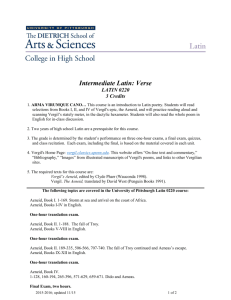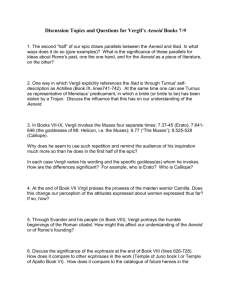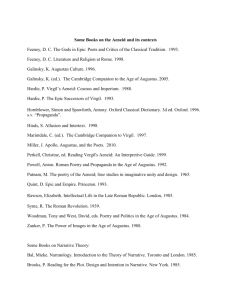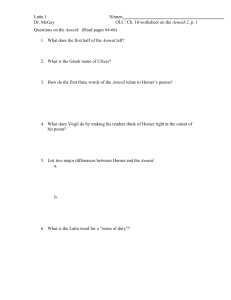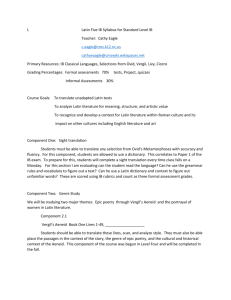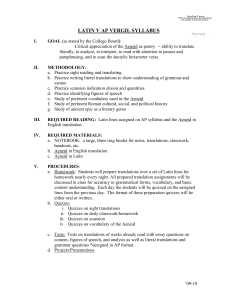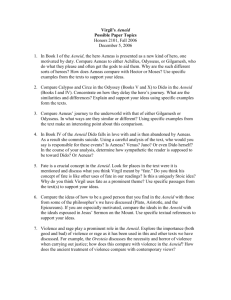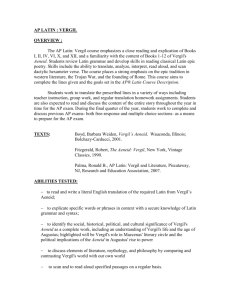Lat 220: VERGIL'S AENEID
advertisement
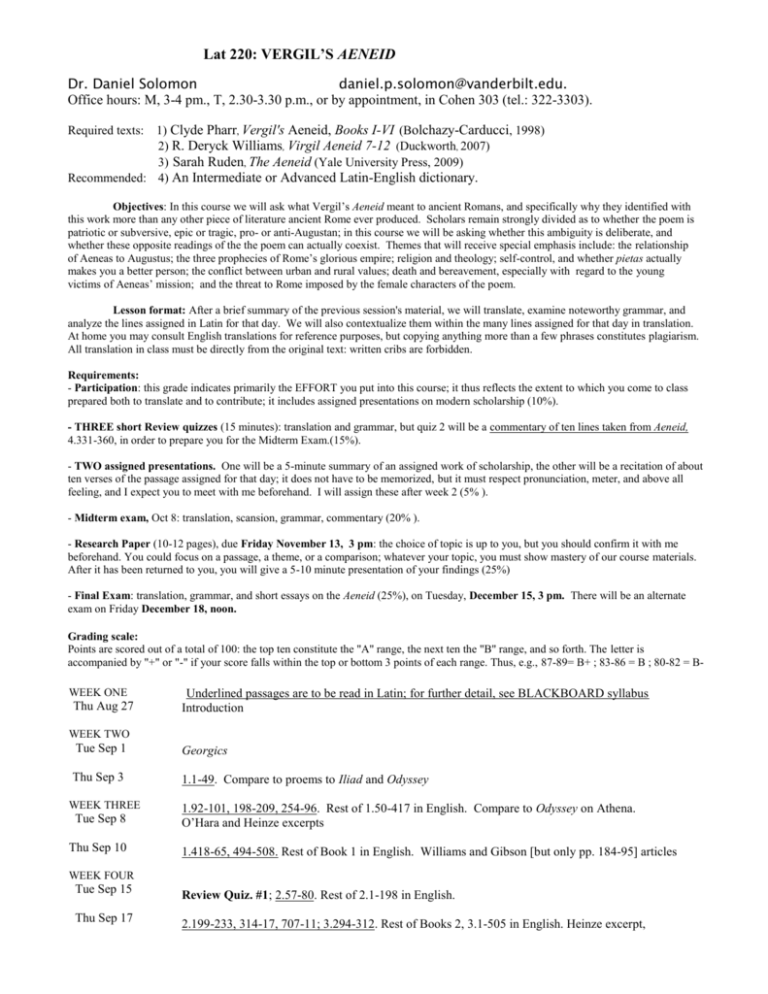
Lat 220: VERGIL’S AENEID Dr. Daniel Solomon daniel.p.solomon@vanderbilt.edu. Office hours: M, 3-4 pm., T, 2.30-3.30 p.m., or by appointment, in Cohen 303 (tel.: 322-3303). 1) Clyde Pharr, Vergil's Aeneid, Books I-VI (Bolchazy-Carducci, 1998) 2) R. Deryck Williams, Virgil Aeneid 7-12 (Duckworth, 2007) 3) Sarah Ruden, The Aeneid (Yale University Press, 2009) Recommended: 4) An Intermediate or Advanced Latin-English dictionary. Required texts: Objectives: In this course we will ask what Vergil’s Aeneid meant to ancient Romans, and specifically why they identified with this work more than any other piece of literature ancient Rome ever produced. Scholars remain strongly divided as to whether the poem is patriotic or subversive, epic or tragic, pro- or anti-Augustan; in this course we will be asking whether this ambiguity is deliberate, and whether these opposite readings of the the poem can actually coexist. Themes that will receive special emphasis include: the relationship of Aeneas to Augustus; the three prophecies of Rome’s glorious empire; religion and theology; self-control, and whether pietas actually makes you a better person; the conflict between urban and rural values; death and bereavement, especially with regard to the young victims of Aeneas’ mission; and the threat to Rome imposed by the female characters of the poem. Lesson format: After a brief summary of the previous session's material, we will translate, examine noteworthy grammar, and analyze the lines assigned in Latin for that day. We will also contextualize them within the many lines assigned for that day in translation. At home you may consult English translations for reference purposes, but copying anything more than a few phrases constitutes plagiarism. All translation in class must be directly from the original text: written cribs are forbidden. Requirements: - Participation: this grade indicates primarily the EFFORT you put into this course; it thus reflects the extent to which you come to class prepared both to translate and to contribute; it includes assigned presentations on modern scholarship (10%). - THREE short Review quizzes (15 minutes): translation and grammar, but quiz 2 will be a commentary of ten lines taken from Aeneid, 4.331-360, in order to prepare you for the Midterm Exam.(15%). - TWO assigned presentations. One will be a 5-minute summary of an assigned work of scholarship, the other will be a recitation of about ten verses of the passage assigned for that day; it does not have to be memorized, but it must respect pronunciation, meter, and above all feeling, and I expect you to meet with me beforehand. I will assign these after week 2 (5% ). - Midterm exam, Oct 8: translation, scansion, grammar, commentary (20% ). - Research Paper (10-12 pages), due Friday November 13, 3 pm: the choice of topic is up to you, but you should confirm it with me beforehand. You could focus on a passage, a theme, or a comparison; whatever your topic, you must show mastery of our course materials. After it has been returned to you, you will give a 5-10 minute presentation of your findings (25%) - Final Exam: translation, grammar, and short essays on the Aeneid (25%), on Tuesday, December 15, 3 pm. There will be an alternate exam on Friday December 18, noon. Grading scale: Points are scored out of a total of 100: the top ten constitute the "A" range, the next ten the "B" range, and so forth. The letter is accompanied by "+" or "-" if your score falls within the top or bottom 3 points of each range. Thus, e.g., 87-89= B+ ; 83-86 = B ; 80-82 = BWEEK ONE Thu Aug 27 Underlined passages are to be read in Latin; for further detail, see BLACKBOARD syllabus Introduction WEEK TWO Tue Sep 1 Georgics Thu Sep 3 1.1-49. Compare to proems to Iliad and Odyssey WEEK THREE Tue Sep 8 Thu Sep 10 1.92-101, 198-209, 254-96. Rest of 1.50-417 in English. Compare to Odyssey on Athena. O’Hara and Heinze excerpts 1.418-65, 494-508. Rest of Book 1 in English. Williams and Gibson [but only pp. 184-95] articles WEEK FOUR Tue Sep 15 Review Quiz. #1; 2.57-80. Rest of 2.1-198 in English. Thu Sep 17 2.199-233, 314-17, 707-11; 3.294-312. Rest of Books 2, 3.1-505 in English. Heinze excerpt, WEEK FIVE Knox article Tue Sep 22 3.714-18; 4.1-5, 54-89, 141-50, 160-95. Rest of 4.1-304 in English. Compare to Apollonius on the “marriage” of Jason and Medea, and to Iliad on deer simile. Perkell article [1st half] Thu Sep 24 Review Quiz #2; 4.305-61 WEEK SIX Tue Sep 29 4.362-415, 437-73. 4.416-36, 474-641 in English. Cairns excerpt (pp. 43-52), Perkell article [2nd half] Thu Oct 1 WEEK SEVEN 4.642-705. Spence article Tue Oct 6 Thu Oct 8 WEEK EIGHT Tue Oct 13 Thu Oct 15 6.450-76, 544-47. Rest of Books 5 and 6.1-543 in English. Compare to Odyssey on Nekuia. Parry article MIDTERM EXAM 6.788-807, 826-854. Rest of Book 6 in English. O’Hara excerpt, Feeney article 7.37-45, 286-340, 591-600. Rest of Book 7 in English. Reckford article WEEK NINE Tue Oct 20 8.222-32, 241-61, 558-84. 8.1-221, 233-40, 262-369, 464-553 in English. Galinsky article Thu Oct 22 OCT. BREAK WEEK TEN Tue Oct 27 8.387-406; 678-731. Rest of Book 8 in English. Compare to Iliad on Thetis and Hephaestus. Gutting and Casali articles Thu Oct 30 WEEK ELEVEN 9.176-206, 420-49. Rest of Book 9 and 5.286-361 in English. Duckworth article, Wiltshire and Oliensis excerpts Tue Nov 3 Review Quiz #3; 10.96-117. 10.1-95 in English. Thu Nov 5 WEEK TWELVE 10.783-820, 873-908. Rest of Book 10 in English. Compare to Iliad on Zeus and Sarpedon. Benario and Kronenberg articles Tue Nov 10 11.376-95; 410-43. 11.1-375, 396-409 in English. Wiltshire excerpt, Fantham article Thu Nov 12 Paper due Fri 3 pm 11.648-65; 778-815. Rest of Book 11 in English. Fratantuono and West articles Tue Nov 17 12.1-36, 54-80. 12.55-79, 81-324 in English. Johnson excerpt, Pogorzelski article. Compare Latinus and Amatato Hector’s parents in Iliad. Thu Nov 19 12.791-852. 12.325-790 in English. Johnson excerpt and Perkell article Nov. 21-29 THANKSGIVING BREAK WEEK THIRTEEN Tue Dec 1 12.887-952. Compare to the ending of Iliad and Odyssey. Putnam excerpt, Stahl and Galinsky articles Thu Dec 3 Presentations WEEK FOURTEEN Tue Dec 8 Presentations Thu Dec 10 Presentations Full citations of secondary sources listed on syllabus (for a fuller bibliographies, see 1) L'année philologique – this is the primary database of Classical Scholarship, but you must access it through our Library Catalog; 2) The TOCS-IN database hosted by the University of Toronto; it is a little less comprehensive but it is much easier to navigate, and you can access it directly at http://www.chass.utoronto.ca/cgi-bin/amphoras/tocfind 3) for divisions by topic, see Shirley Werner’s useful list [though she includes nothing later than 1999] at http://www.vroma.org/~bmcmanus/werner_vergil.html): Benario, Herbert W. "The Tenth Book of the Aeneid," in Transactions of the American Philological Association 98 (1967) 23-36. Braund, Susanna Morton. "Virgil and the Cosmos. Religious and Philosophical Ideas," in Charles Martindale, ed., The Cambridge Companion to Vergil 204-221. Cambridge. 1997. Cairns, Francis. Virgil's Augustan Epic. Cambridge. 1989. Casali, Sergio. “The Making of the Shield: Inspiration and Repression in the Aeneid,” in Greece & Rome 53 (2006) 185-204. Duckworth, G. E. "The Significance of Nisus and Euryalus for Aeneid IX-XII,” in American Journal of Philology 88 (1967) 129-150. Fantham, Elaine “Fighting Words: Turnus at Bay in the Latin Council ("Aeneid" 11.234-446),” in American Journal of Philology 120 (1999) 259-280. Feeney, D.C. "History and Revelation in Vergil's Underworld," in Proceedings of the Cambridge Philological Society 32 (1986) 1-24. Reprinted in Stephanie Quinn, ed., Why Vergil? A Collection of Interpretations 108-122. Wauconda. 2000. Fratantuono, Lee. “Virgil’s Camilla,” in Athenaeum 95 (2007) 271-286 Galinsky, Karl. “The Hercules-Cacus Episode in Aeneid VIII,” in American Journal of Philology 87 (1966) 18-51 ------------------- "How to Be Philosophical About the End of the Aeneid," in Illinois Classical Studies 19 (1994) 191-201 Gibson, Roy. “Aeneas as hospes in Vergil, Aeneid 1 and 4,” in Classical Quarterly 49 (1999) 184-202. Gutting, Edward “Marriage in the Aeneid: Venus, Vulcan, and Dido,” in Classical Philology 101 (2006) 262-79 Hardie, Philip R. Virgil's Aeneid. Cosmos and Imperium. Oxford. 1986. Heinze, R. Vergils epische Technik. Leipzig. 1915. 3d ed. 1928 = Virgil's Epic Technique. Translated by H. and D. Harvey and F. Robertson. Berkeley. 1993. Johnson, W. R. Darkness Visible. A Study of Virgil's Aeneid. Berkeley. 1976. Knox, B. M. W. "The Serpent and the Flame. The Images of the Second Book of the Aeneid," in American Journal of Philology 71 (1950) 379-400. Kronenberg, Leah “Mezentius the Epicurean” in Transactions of the American Philological Association 135 (2005) 403-431. O'Hara, James J. Death and the Optimistic Prophecy in the Aeneid. Princeton. 1990. Oliensis, Ellen. "Sons and Lovers. Sexuality and Gender in Virgil's Poetry,” in Charles Martindale, ed., The Cambridge Companion to Vergil 294-311. Cambridge. 1997. Parry, Adam. “The Two Voices of Vergil's Aeneid,” in Arion 2 (1963) 63-80. Reprinted in Stephanie Quinn, ed., Why Vergil? A Collection of Interpretations 155-167. Wauconda. 2000. Perkell, Christine. "On Creusa, Dido, and the Quality of Victory in Virgil's Aeneid," in Women's Studies 8 (1981) 201-223. Reprinted in Helene Foley, ed., Reflections of Women in Antiquity, 355-377. New York. 1981. Pogorzelski, Randall J. “The ‘Reassurance of Fratricide’ in the Aeneid," in American Journal of Philology, 130 (2009), 261-289 Reckford, K. J. "Latent Tragedy in Aeneid VII 1-285," in American Journal of Philology 82 (1961) 252-269. Spence, Sarah. “Varium et Mutabile: Voice of Authority in Aeneid 4,” in Christine Perkell, ed., Reading Vergil's Aeneid: An Interpretive Guide, chapter 4. Oklahoma. 1999. Stahl, Hans-Peter. "The Death of Turnus. Augustan Vergil and the Political Rival," in K.A. Raaflaub and M. Toher, eds. Between Republic and Empire. Interpretations of Augustus and His Principate 174-211 Berkeley. 1990. West, Grace Starry, “Chloreus and Camilla,” in Vergilius 31 (1985) 21-29 Wiltshire, Susan. Public and Private in Vergil's Aeneid. Amherst. 1989. Williams, R. D. "The Pictures on Dido's Temple (Aeneid 1.450-93)," in Classical Quarterly 10 (1960) 145-151.
